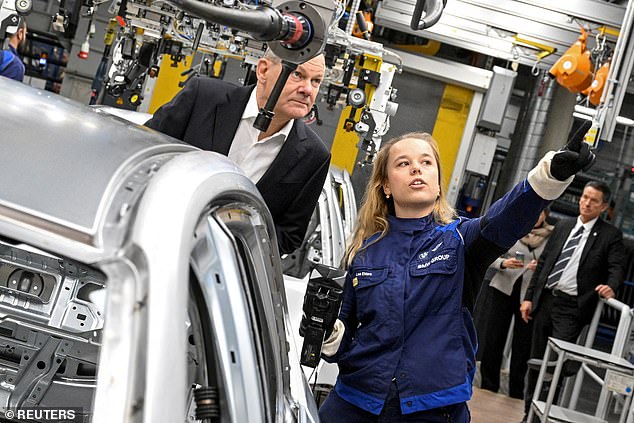Germany goes kaput: how Net Zero is killing Europe’s most efficient industrial machine
Earlier this year, an acquaintance was encouraged to purchase an electric car (EV) as a company car.
He chose a BMW iX passenger car from the top segment, with bells and whistles.
Everything was going well until the expensive, fully charged electric car – loaded with family – stopped on a busy suburban street.
Emergency services were called, but no one could get the car to start. Ultimately, it was towed to the BMW dealer, where it remained for two months as the mechanics and diagnostic equipment struggled to locate and correct the fault.
The technical collapse of one of Germany’s most admired brands offers a metaphor for the hasty transformation in car production.
The global shift from combustion engines to electric vehicles, accelerated by climate change targets, is wreaking havoc on car production across Europe.
Crisis: Germany’s Luddite attitude to new technology and IT, an obsession with old-fashioned manufacturing and a snail-like adaptation to greener energy (it still burns coal) have put the country on the slow road
In Britain, an industry that has emerged from the industrial destruction of the last century is once again facing a fragile future.
After 120 years of building cars in Luton, Vauxhall is closing its operations, putting more than 1,000 jobs at risk because it cannot make the economics of electric cars work.
This comes hot on the heels of a similar decision by US company Ford, which wants to wipe out 800 jobs.
There is now a significant risk that Sunderland-based Japan’s Nissan, which has enthusiastically embraced the EV revolution, decides it can no longer meet the challenging targets for battery production and the switch to electric.
As Europe’s most important economy, Germany faces the greatest obstacles. In recent decades, Britain and much of the rest of the world have bought into the narrative of Germany as the world’s tech powerhouse.
The best mechanical experts and a supply chain embedded in the often family-owned Mittelstand – small and medium-sized manufacturing companies – created an unparalleled reputation for reliability.
Whether it concerns cars, white goods, water filters or industrial equipment, we rely on German technology.
A combination of prudent fiscal policy, sound money, manufacturing skills and political stability offered an idealized model for Western democracies.
However, BMW’s bad luck is more than just an unfortunate anecdote. It is emblematic of a broken economic model, as described by German writer Wolfgang Munchau in his new book Kaput: The End Of The German Miracle.
The country’s Luddite attitude to new technology and IT, an obsession with old-fashioned manufacturing and a snail-like adaptation to greener energy (it still burns coal) have put Germany in a slow orbit.
Even Britain’s much-disparaged economy is growing faster than the European locomotive. As if this were not bad enough, the political situation is dire.
While the eyes of the world were focused on Washington and the US election results on November 5, the German government, led by the weakened Social Democratic Chancellor Olaf Scholz, was collapsing.
The immediate cause was an investigative dispute over the violation of a debt limit, but tensions run deep. The result is months of political and fiscal uncertainty.
A confidence vote is planned for December 16 and a general election is likely to take place on February 16. The right-wing Alternativ für Deutschland (AfD) is among the parties hovering in the wings.
Germany’s post-war economic rebirth needs a makeover. It is the fourth largest economy in the world and scores highly on global indexes for good living standards, healthcare and education.
At a time when other Western countries are drowning in excessive borrowing, the national debt to national output stands at a modest 62.9%.
That makes German government bonds, the equivalent of British government bonds, a gold standard against which other Western bonds are measured.
Yet the real economy of production and employment functions poorly. The country has doubled manufacturing and car production, while much of the rest of the world has focused on the technology, digital and services sectors.
About 26 percent of production in Germany is generated by making things, mainly cars.
German car production focused on high-quality, beautifully designed fossil fuel vehicles as global trade boomed. Elon Musk’s Tesla paved the way for a new generation of electronically controlled EVs at premium prices.
China, one of the largest markets for German cars, got the message and started mass-producing electric cars at lower prices.
This placed the German car industry under enormous pressure.

In trouble: German Social Democratic Chancellor Olaf Scholz visits the BMW Group factory in Munich
Production there peaked at 6 million vehicles in 2012, as the country’s economy showed resilience after the major financial crisis.
Since then production has fallen and production hovers around 4 million.
Nothing illustrates the competitive challenge better than Volkswagen, market leader in Europe every year since 2005.
The company has the highest labor costs of any car company in the world. The country has canceled the wage agreements and wants to implement wage cuts. The company says rising factory costs are 25 to 50 percent higher than competitors.
Faced with the EV and price challenges, Scholz has raised trade barriers against China, which has been the largest export market for decades.
Unlike other Western economies, Germany has avoided much of the asset price bubble of the Great Financial Crisis.
Until 2018, it experienced a golden period of expansion. Since then, however, industrial production has stagnated and car production has declined. As a result, Germany has underperformed almost all of its European rivals – including Britain.
The International Monetary Fund expects Germany to flirt with a recession this year, with output falling 0.2 percent.
The Fund lowered its forecast for 2025 from a paltry 1.3 percent to just 0.8 percent. There will be downward pressure on living standards and employment.
Munchau blames the German miracle on technophobia in a country where 80 percent of companies still communicate by fax.
The country’s big tech hope, fintech group Wirecard, ended in disaster when it went bankrupt in 2020 after the discovery of a massive fraud.
The war in Ukraine has dealt a devastating blow to the country’s energy security.
Former Chancellor Angela Merkel had ordered the closure of all nuclear power plants after the 2011 Fukushima nuclear disaster in Japan.
This made the country increasingly dependent on Russian gas, which is now under embargo. The country is still highly dependent on fossil fuels; 30% of production comes from burning coal.
Britain’s last coal-fired power station closed in September this year.
The pandemic, Russia’s war against Ukraine and the green revolution in the automotive sector have devastated the German economic model.
The country has been plagued by dependence on an ancient banking system, distrust of technology, lagging creative industries, energy dependence on Russia and deep trade ties with China.
Moreover, the country is haunted by economic orthodoxies rooted in historical fears of a repeat of the Weimar Republic’s terrible inflation.
All this has given political hope to veteran opposition leader Friedrich Merz, 69, of the Christian Democratic Union (CDU).
He has spent much of the past decade burnishing his new economic reputation as chairman of the supervisory board of world-leading asset manager BlackRock.
His stated goal is to use his skills in the free market to make the German economy competitive again. It is a formidable challenge.
- Kaput: The End of the German Miracle by Wolfgang Munchau (Swift £20, pp256).
DIY INVESTMENT PLATFORMS

A. J. Bell

A. J. Bell
Easy investing and ready-made portfolios

Hargreaves Lansdown

Hargreaves Lansdown
Free fund trading and investment ideas

interactive investor

interactive investor
Invest for a fixed amount from € 4.99 per month

Sax

Sax
Get £200 back in trading fees

Trade 212

Trade 212
Free trading and no account fees
Affiliate links: If you purchase a product, This is Money may earn a commission. These deals have been chosen by our editors because we believe they are worth highlighting. This does not affect our editorial independence.
Some links in this article may be affiliate links. If you click on it, we may earn a small commission. That helps us fund This Is Money and keep it free to use. We do not write articles to promote products. We do not allow a commercial relationship to compromise our editorial independence.
